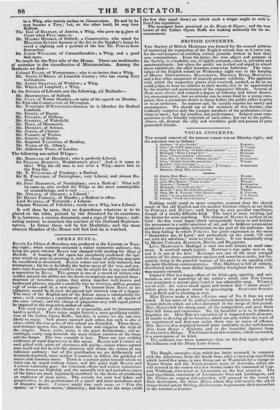VOCAL CONCERTS.
THE second concert of the present season was on Monday night ; and the selection was as follows.
I, Anthem, .0 give thanks" PURCELL. 2. Glee," As it tell upon a day," T. CoORE. 3. Song, Miss HAWES, "0 Loot whose mercies" HANDEL.
4. Madrigal." Have 1 found her?" HATESON.
5, Duet," Fairest maiden" (Jessonflu) SPON R.
6, Aria, Mrs. K. SEGUIN. " Ombra adorata" NVESBE. HUOMELML 7. Glee," Swiftly from the mountains" 8. Quintet, "Joy returning ". All-j lli Creatoi ")(Deluge) S
_CHNEIDER,
9. Chorus, " ust, a.wse Fantasia, Harp, Hiss RICHARDsON.
10. Gloria, First Mass 1lAyoN,
11. Glee, ".0 my love's like a red red rose" KNYVETT. 12. Aria, Miss litacit. "Come scoglio" Momer.
13. Terzetto,"Trumati" BEETHOVEN.
14. Madrigal," so saitlt my far" L. HAREEM°. 15. Quartet," Over the dark blue waters" WEBER.
16. Song, Mr. E. TAYLOR," The Pirate's song" E. TAYLOR.
17. Glee, "As ou a summer's day" J. S. Salm. 18. Chorus," Swell the fill chorus" HANDEL.
Nothing could stand in more complete contrast than the church music of the old English and the modern German school, as set forth by PURCELL and HAYDN ; each having its own peculiar excellence, though of a totally different kind. The latter is more exciting, but the former far more touching. The climax of HAYDN is perfect of its kind : the fine vocal fugue which unexpectedly bursts in and finishes the movement is a noble specimen of art, and its brilliant termination
produced a corresponding enthusiasm on the part of the audience: but the deep feeling to which Puncsass has given expression in the verse " Remember me, 0 Lord," and particularly on the words "0 visit me with thy salvation," went to every heart. It was beautifully sung
by Master COWARD, HAWKINS, HOBBS, and BRADBURY. LUCA MARENZIO'S Madrigal is now too well known to need com- ment. It received ample justice. BATESON'S was quite new to us, and it is one of his best. BATESON was one of the most unequal writers of his time—sometimes careless and sometimes crude, but fre- quently rising in the graceful texture of his parts to an equality with his most illustrious contemporaries. This Madrigal is full of melody, distributed with the most skilful impartiality throughout the score. It
was warmly encored.
CooisE's Glee is a happy effort of its kind—gay, sportive, and ani. mated—a sort of transcript of the author's mind, (did Tost COOKE
ever perpetrate a serious glee ?) and it was admirably sung. WEBBE'S not so well : the voices stood apart, and wanted that " union sweet"
which gives its greatest charm to glee-singing. STAFFORD SMITH'S was as fresh and as pleasing as ever.
Miss HAWES made a more effective song of No. 3 than we ever
heard. It has some of its author's characteristic beauties, mixed with certain defects which are often discerned in the songs of that period. Miss HAWES felt time strong parts of the composition, and gave them their full force and expression. No. 12, beautiful as it is, is almost a forgotten air. Miss Botert's execution of it imparted much pleasure. If unable to develop all its beauties, which are only within the reach of an experienced and first-rate altist, there was no cause of offence. Mrs. SEGUIN also acquitted herself most creditably in the well-known
Aria from Romeo e Giulietta, and in the beautiful Quintet from SCIINEloeft's Deluge. The Chorus from this oratorio, which succeeded,
is a masterpiece of its kind. The audience was more numerous than on the first night, spite of the influenza and the Drury Lane dinner.


























 Previous page
Previous page